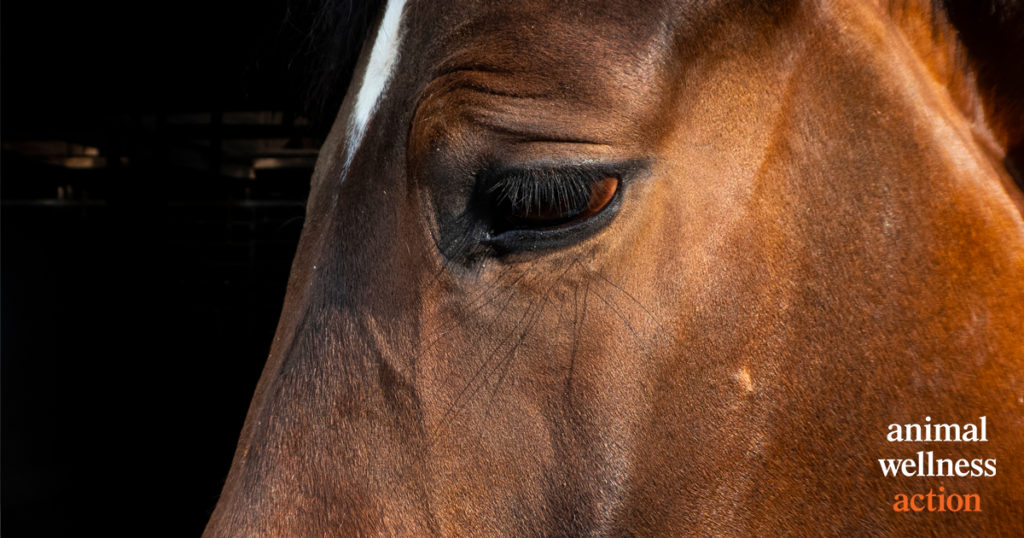When it comes to eating animals, certain species are off limits. American don’t eat dogs or cats; they are our companions. We don’t eat horses either; they’ve carried us into battle and helped us settle the nation. Yet, in a contradiction that cannot endure, the U.S. has been a “producer” nation when it comes to horses. Kill buyers gather up horses, often disreputably, and ship them out to foreign slaughter plants where they are butchered, with the meat then on its way to foreign dinner plates in France, Italy, and Japan.
In the first part of this century, there were perhaps a few dozen horse slaughter plants in the U.S., even though restaurant patrons rarely spied horse meat on the menu. Horse meat was, however, used in dog food and sent to zoos for the big cats and some of the other animals on exhibit. And recognizing the instinctive domestic revulsion at the idea of slaughtering and eating horses for human consumption, the industry turned its sights to foreign markets.
But demand in the foreign markets has been receding, and the industry in decline. And the industry is now smaller or more politically vulnerable than at any time in the last century. The last three U.S.-based slaughter plants – two in Texas and one in Illinois – were shuttered in 2007. Since then, the industry has become purely an export enterprise, with the number of live animals shipped across national lines for slaughter was just over 81,000 horses in 2018; in 2021, that number dropped to just over 23,000 animals. Mexico, the top destination for live exports, has seen a seen a 74 percent decrease in the number of American horses sent south of the border for slaughter.
As the debate raged, Americans became aware that retired racehorses, former show and rodeo horses, children’s pet ponies, and even a former Kentucky Derby winner (Ferdinand), were funneled into the slaughter pipeline.
Increasingly made aware by global campaigns about the cruelty of the slaughter trade, and the place of the horses in the human experience, consumers are skipping horse as their meat of choice. They are also becoming aware of the dangerous drugs injected into racehorses, show horses, and other working animals, and how their residues threaten human health. Yet another wake-up moment was the European horse meat scandal of 2013, when horse was detected in a variety of frozen food items falsely labeled as beef.
Through the years, federal anti-horse slaughter legislation has gained more support. While federal lawmakers have voted just about every year since 2006 to prevent any horse slaughter plants from opening, a bigger legislative package to ban live exports of horses to Canada and Mexico foundered. There was a winning vote in the House on that measure in 2007, but it never made it to the Senate. Animal Wellness Action repeated the feat in 2021, but again, the Senate failed to act.
At this point, the difficulty of securing final enactment of the legislation is due less to the strength of horse slaughter proponents and due more to the general dysfunction in Congress. On animal welfare issues, the Congress often requires near consensus to act.
It’s true that the American Farm Bureau Federation and National Cattlemen’s Beef Association actively lobby against a ban on horse slaughter, offering the tired refrain of a “slippery slope” argument, i.e., “today horses, tomorrow cattle and pigs.” Along with the American Quarter Horse Association (AQHA), the Paint horse and Arabian breed groups have adopted pro-slaughter positions on the grounds that owners should have slaughter as an option for horses they no longer want. And the nation’s top two veterinary groups, the American Veterinary Medical Association (AVMA) and American Association of Equine Practitioners (AAEP), both oppose a federal ban on horse slaughter for similar reasons. But the positions of these groups hold sway with a diminishing share of lawmakers.
We must press the case. The only reasonable pathway to securing a North American ban on the slaughter of horses from the U.S. is to pass legislation in Congress. One way to take definite steps in that direction is to forbid horse transport for slaughter from more states, as New York recently did in banning the movement of retired racehorses to Canada for slaughter.
Our anti-horse-slaughter amendment passed in the House last year was written to ban any transport of horses for the purposes of slaughter, including to Canada or Mexico. The measure was supported by more than 225 animal and equine groups, organizations, businesses, and trade associations, including The Jockey Club, The Breeders’ Cup, The Preakness Stakes, The Belmont Stakes, the Water, Hay, Oats Alliance – proof we’ve turned the tide against slaughter with the assistance of our allies in the horse world. The measure’s success was a strong indicator of the super-majorities this issue now commands in Congress.
No animal has played a more pivotal role in the development of a nation than the horse did in the United States. We have elevated these creatures, both wild and domestic, to icon status. We name our fast cars and sports teams after equines, we cast them in starring roles in film and television, and they feature prominently in American literature. This cultural love of the horse must be transformed into real, permanent protections. The forces who prey on horses are more marginalized than ever. But to secure comprehensive ban on the slaughter of American horses throughout North America, we need your support and your tireless advocacy. The drop in slaughter numbers reminds us that ultimate victory is within our grasp, but it will take our every effort to win a lasting and long-overdue peace for our cherished equines.
Scott Beckstead is the Director of Campaigns for Animal Wellness Action and the Center for a Humane Economy.
